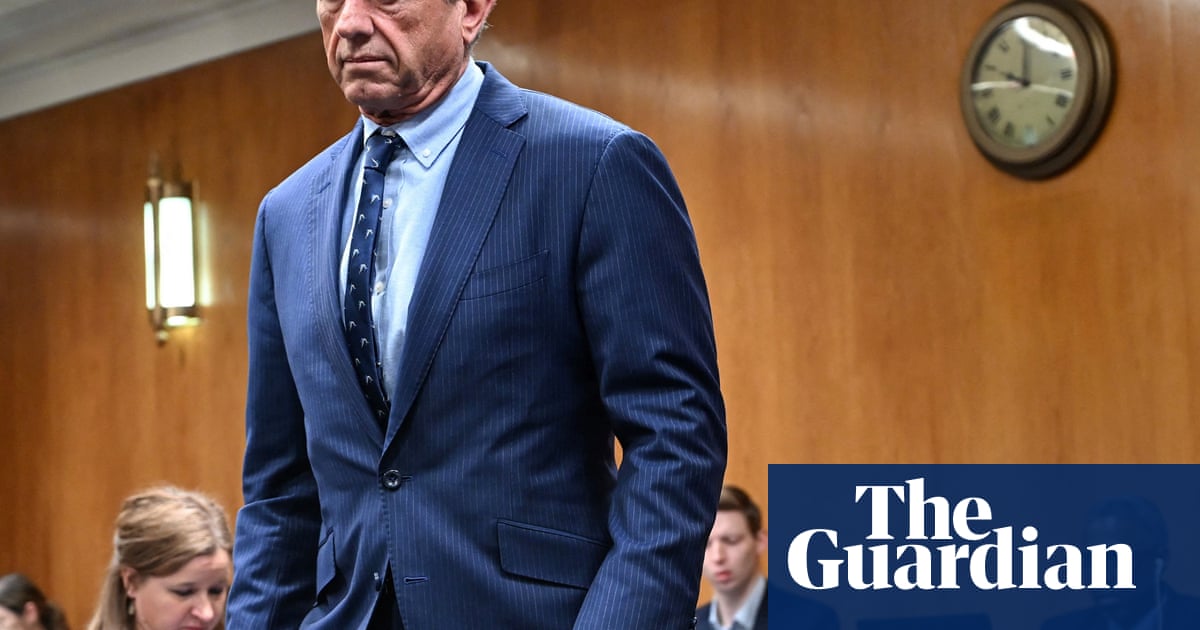A new report led by health secretaryRobert F Kennedy Jrlays out a dark vision of American children’s health and calls for agencies to examine vaccines, ultra-processed foods, environmental chemicals, lack of exercise and “overmedicalization”.
Kennedy has made combatting the chronic disease “epidemic” a cornerstone of his vision for the US, even as he has ignored common causes of chronic conditions, such assmoking and alcoholuse.
The 69-page report is the result of aFebruary executive orderby Donald Trump that established a “Make America Healthy Again” (Maha) commission and required it to report on children’s health.
While the report broadly summarizes scientific evidence about nutrition, mental health, chemical exposures and children’s mental health, it ignores the leading causes of death for children –firearmsandmotor vehicleaccidents – and one of the most common chronic conditions:dental cavities.
“We will save lives by addressing this chronic disease epidemic head-on. We’re going to save a lot more money in the long run – and even in the short run,” Kennedy said in apress callon Thursday about the report.
Notably, the report reflects some of Kennedy’s bugbears where science is unsettled, but argues research “demonstrates the need for continued studies”, such as on fluoride in water and electromagnetic radiation.
The report also criticizes the growth in the childhood vaccine schedule. The vaccine schedule is widely accepted in the medical community as safe and effective. Additions are publicly debated in meetings with both career government scientists and outside expert advisers.
It also points to research that the report argues “raise[s] important questions” about medications – such as antidepressants, stimulants, GLP-1 weight-loss drugs and gender-affirming care – which are widely considered safe and even standard care.
The flavor of the report is well-represented in a section on “medicalization”, which describes the potential for “undetected but potentially major long-term repercussions”. The portion describes “established harms” as “the tip of a potentially vast iceberg representing both detectable short term negative effects, and potentially hidden negative effects with long term implications”.
The report comes as the administration has taken a raft of actions researchers consider contrary to the health of Americans, such as eliminating world-leadingsexually transmitted disease research laboratoriesand highly effectivetobacco-prevention officesand pushinghealth leadersand researchers to quit orbe firedin the face ofcensorshipandpoliticization.
While the report compares US life expectancy and healthcare costs to peer-developed democracies, it does not mention how other nations typically finance healthcare for all citizens: often at minimal or no cost.
By contrast, about 26 million Americans lack health insurance coverage, and the Republican-controlled Housepassed a billonly hours earlier that was expected to kick 13 million low-income people off public health insurance by 2033 and cut federal food support for the poor. Health spending in the US is also characterized by unbridled prices and substantial administrative costs associated with administering a labyrinthine public-private system.
In spite of the report’s apparent bias toward issues of concern for Kennedy, there are some areas which, much like the Maha movement itself, will make strange political bedfellows. For instance, many of the left and right likely share concerns over industry capture of regulators of food, pharmaceuticals and chemicals.
“Pesticides, microplastics and dioxins are commonly found in the blood and urine of American children and pregnant women – some at alarming levels,” the report states, citing issues of pollution that will likely resonate on a bipartisan basis.
Sign up toHeadlines US
Get the most important US headlines and highlights emailed direct to you every morning
after newsletter promotion
In the past, it has been Republicans who typically fought against regulations on those industries. This anxiety was reflected even before the report’s release, as many Republicans representing rural and agricultural districts criticized the report before its publication, including ina letterfrom 79 Republican lawmakers in early April and in questioning from the Mississippi Republican senator Cindy Hyde-Smith this week on Capitol Hill.
“It’s no secret you were involved with pesticide litigation prior to becoming secretary,” said Hyde-Smith, who asked whether Kennedy could remain objective when writing the report.
“There is not a single word in them that should worry the American farmer,” Kennedy replied.
“You can prove that beyond a shadow of a doubt?” Hyde-Smith retorted.
“You’ll see the report,” Kennedy said.
That pressure, in turn, has promptedpushbackfrom influencers in Kennedy’s orbit, including many who identify directly with the Maha movement.
The work of the Maha commission wasreportedly spearheadedby senior the Kennedy advisor Calley Means, a former food lobbyist and healthcare entrepreneur who rose to prominence as a Maha “truth-teller”. Means co-wrote a bestselling book with his sister, the current US surgeon general nominee Casey Means, which blames many of the US’s ills on sedentary lifestyle and poor diet.
